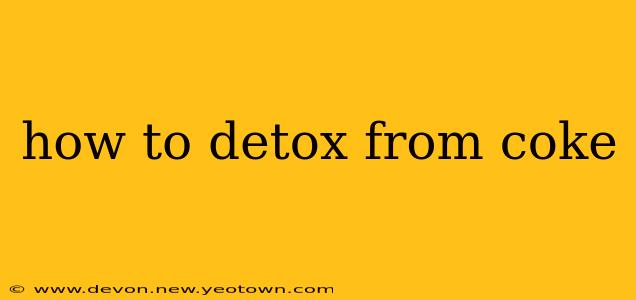How to Detox from Coke: A Guide to Recovery
The journey from cocaine addiction is arduous, but it's a journey worth taking. This isn't just about physical detox; it's about reclaiming your life and building a healthier future. This guide provides information, but it's crucial to remember: professional help is essential for safe and effective detoxification. Attempting a detox alone can be incredibly dangerous.
What is Cocaine Detoxification?
Cocaine detoxification is the process of removing cocaine and its metabolites from your body. This isn't a quick fix; it involves managing severe withdrawal symptoms, which can be incredibly challenging both physically and psychologically. The severity of withdrawal depends on several factors, including the amount and frequency of cocaine use, the individual's overall health, and the presence of other substances involved.
What are the Symptoms of Cocaine Withdrawal?
Understanding the symptoms is the first step in navigating the process:
- Intense Cravings: An overwhelming urge to use cocaine is a primary symptom, often accompanied by anxiety and irritability.
- Depression and Mood Swings: Severe mood swings, ranging from intense sadness to agitation, are common. Suicidal thoughts can also emerge.
- Fatigue and Lethargy: Extreme tiredness and lack of energy are often experienced, making even simple tasks feel overwhelming.
- Increased Appetite: After the initial period of suppressed appetite, many experience intense hunger.
- Sleep Disturbances: Insomnia and vivid, disturbing dreams are typical.
- Psychomotor Agitation or Retardation: This can manifest as restlessness and inability to sit still or conversely, extreme lethargy and slowness.
- Anxiety and Panic Attacks: These can be debilitating and require immediate medical attention.
How Long Does Cocaine Detox Take?
The duration of cocaine detox varies depending on individual factors. The acute withdrawal phase typically lasts several days, but the psychological cravings and other lingering effects can persist for weeks or even months. This is why ongoing support is vital.
What are the Medical Risks Associated with Cocaine Detox?
Cocaine withdrawal can be medically dangerous. The potential risks include:
- Cardiac Problems: Cocaine puts significant stress on the heart, and withdrawal can exacerbate these issues, leading to heart attack or stroke.
- Seizures: Seizures are a serious risk, particularly in individuals with a history of epilepsy or other neurological conditions.
- Psychosis: Some individuals experience psychosis, including hallucinations and delusions, during withdrawal.
- Suicidal Thoughts and Behaviors: The intense emotional distress of withdrawal increases the risk of self-harm or suicide.
What are the Treatment Options for Cocaine Detox?
Never attempt a detox alone. Seek professional help immediately. Treatment options may include:
- Medical Detoxification: This takes place in a medically supervised setting, providing medication to manage withdrawal symptoms and monitoring for complications.
- Inpatient Rehabilitation: This offers comprehensive support, including medical care, therapy, and counseling.
- Outpatient Treatment: This is suitable for some individuals, but it requires significant self-discipline and a strong support system.
- Medication-Assisted Treatment (MAT): While no medication directly treats cocaine addiction, some medications can manage specific symptoms like anxiety and depression, making the process more manageable.
What Happens After Detox?
Detox is just the first step. Long-term recovery requires ongoing support, including therapy, counseling, and participation in support groups. Relapse is a real possibility, and having a strong support system in place is critical for sustained recovery.
This information is for educational purposes only and does not constitute medical advice. If you or someone you know is struggling with cocaine addiction, please seek immediate professional help. Contact your doctor, a local helpline, or a treatment center.

